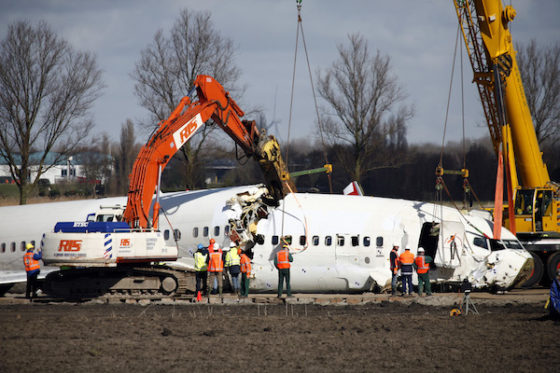Dutch investigators ‘played down’ design flaws after 2009 Boeing crash: NYT


Dutch investigators played down the importance of design and safety flaws following the crash of a Boeing 737 near Amsterdam in February 2009, following pressure from Boeing and US officials, the New York Times said on Tuesday.
The official report into the crash blamed the pilots for failing to react properly when a faulty altitude meter led to the engine shutting down and causing the plane to appear to ‘drop out of the sky’ as it was coming in to land. Nine people, including the pilots, died in the crash.
The NYT, however, says it has evidence showing ‘decisions by Boeing, including risky design choices and faulty safety assessments’, also contributed to the accident.
The paper also claims the Dutch Safety Board ‘either excluded or played down criticisms of the manufacturer in its final report’. This happened after what the paper called ‘pushback from a team of Americans that included Boeing and federal safety officials’, the paper said.
The NYT findings would appear to confirm a January 2010 report published by the Telegraaf, which said the pilots of the Turkish Airlines plane were largely not to blame for the accident.
The Telegraaf said a preliminary report by the OVV, which was being circulated in Dutch and US aviation circles, contained heavy criticism of aircraft manufacturer Boeing and pointed out that the company was aware of problems with the altitude meters.
However, the official report, published in May 2010, said the crash was due to ‘a combination of circumstances, including a faulty altitude meter and ‘inadequate response’ from the pilots.’
In 2013, the then-transport minister Wilma Mansfeld told parliament that the altimeter had been repaired on 16 occasions in the year before the crash.
Pressure
Former OVV chairman Pieter van Vollenhoven has denied that the report was unduly influenced. ‘The OVV often comes under pressure, but I swear that this has no influence on our reports. We place a great deal of importance on our independence,’ he told Radio 1 news.
Both Boeing and Turkish Airlines were aware of the problems with the alimeters before the crash. ‘You could switch them off by hand,’ he said. ‘That had happened on two earlier flights. Boeing did not therefore see this as a safety problem.’
Delft University aviation expert Joris Melkert also told NOS he did not believe the OVV had allowed itself to be influenced by Boeing. ‘It is quite normal to let everyone involved comment on a draft report,’ he said. ‘The OVV then decides what to incorporate.’
Thank you for donating to DutchNews.nl.
We could not provide the Dutch News service, and keep it free of charge, without the generous support of our readers. Your donations allow us to report on issues you tell us matter, and provide you with a summary of the most important Dutch news each day.
Make a donation